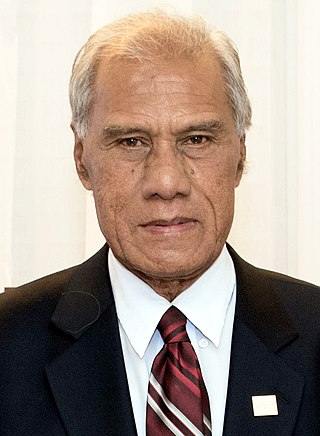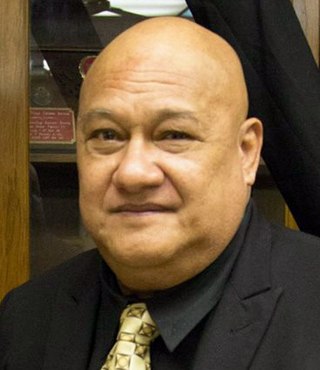Related Research Articles

The history of Tonga is recorded since the ninth century BC, when seafarers associated with the Lapita diaspora first settled the islands which now make up the Kingdom of Tonga. Along with Fiji and Samoa, the area served as a gateway into the rest of the Pacific region known as Polynesia. Ancient Tongan mythologies recorded by early European explorers report the islands of 'Ata and Tongatapu as the first islands having been hauled to the surface from the deep ocean by Maui.

The 2006 Nukuʻalofa riots, also known as the 2006 Tongan riots, started on 16 November, in the Tongan capital of Nukuʻalofa. The Legislative Assembly of Tonga was due to adjourn for the year and despite promises of action, had done little to advance democracy in the government. A mixed crowd of democracy advocates took to the streets in protest. The riots saw a number of cases of robbery, looting, vehicle theft, arson, and various property damage.

Samiuela ʻAkilisi Pōhiva was a Tongan pro-democracy activist and politician. Pohiva, the leader of the Democratic Party of the Friendly Islands (DPFI), served as the Prime Minister of Tonga from 2014 to his death in 2019. He was only the fourth commoner to serve as Prime Minister, and the first commoner to be elected to that position by Parliament rather than appointed by the King.
Early general elections under a new electoral law were held in Tonga on 25 November 2010. They determined the composition of the 2010 Tongan Legislative Assembly.

The Cabinet of Tonga is the cabinet of the government of the Kingdom of Tonga. It is composed primarily of the ministers of government. The latter, including the Prime Minister, are appointed by the monarch. The Governor of Ha'apai and the Governor of Vava'u also serve on the Cabinet ex officio. When in session and presided over by the monarch, the Cabinet is known as the Privy Council.
The Times of Tonga was a biweekly newspaper in Tonga. First published in April 1989, it was published for 30 years by editor and publisher Kalafi Moala and was a frequent target of the Tongan government. Moala sold the business in 2019, and it is now an online publication.
‘Isileli Pulu is a Tongan politician and former Member of the Tongan Parliament. He is a member of the Human Rights and Democracy Movement and the Democratic Party of the Friendly Islands.

Semisi Kioa Lafu Sika is a Tongan politician, businessman, and Member of the Tongan Parliament from 2010 to 2021. He served as acting prime minister in September 2019, following the death of ʻAkilisi Pōhiva. He is currently leader of the Democratic Party of the Friendly Islands.

Siale ʻAtaongo Kaho, Lord Tuʻivakanō is a Tongan politician who served as the Prime Minister of Tonga from 2010 to 2014.

Siosaʻia Lausiʻi, Lord Maʻafu Tukuiʻaulahi, also known as Lord Maʻafu, was a Tongan politician, military officer, and member of the Tongan nobility.

ʻAlipate Tuʻivanuavou Vaea, Lord Vaea is a Tongan politician and a member of the Tongan nobility. He has served as Master of the Royal Household and "long-time palace archivist", as well as being Chairman of the Tonga Traditions Committee.

Siosifa Tuʻitupou Tuʻutafaiva is a Tongan lawyer and politician.
Falisi Tupou is a Tongan journalist and politician.

Mateni Tapueluelu is a Tongan journalist and politician.

Pōhiva Tu’i’onetoa was a Tongan accountant and politician who served as the 17th Prime Minister of Tonga from 2019 to 2021. Tu'i'onetoa succeeded Semisi Sika, who had served as acting prime minister, since the death of ʻAkilisi Pōhiva.

Siaosi ‘Ofakivahafolau Sovaleni, styled Hon. Hu'akavameiliku, is a Tongan politician who has served as the Prime Minister of Tonga since 2021. He has previously served as a Cabinet Minister, and from 2014 to 2017, he was Deputy Prime Minister of Tonga. He is the current estate holder of the village of Ha'asini.
Laki Niu is a Tongan judge and former Member of the Legislative Assembly of Tonga. He was the first Tongan to sit on the Supreme Court of Tonga in over a hundred years.
Poasi Mataele Tei is a Tongan politician and former Member of the Legislative Assembly of Tonga.

General elections were held in Tonga on 18 November 2021 to elect 17 of the 26 seats in the Legislative Assembly.

Sitenimoa Valevale, styled Lord Nuku, is a Tongan noble, politician, and Cabinet Minister. He represents the ʻEua noble constituency in the Legislative Assembly.
References
- ↑ "William Clive Edwards OBE". Edwards LaW. Archived from the original on 23 October 2020. Retrieved 12 December 2020.
- ↑ "The Queen's Birthday Honours List 1995". The Queen's Birthday Honours List 1995. Retrieved 10 July 2018.
- ↑ Norton, Clifford (1988). New Zealand Parliamentary Election Results 1946–1987: Occasional Publications No 1, Department of Political Science. Wellington: Victoria University of Wellington. pp. 193–4. ISBN 0-475-11200-8.
- ↑ Campbell, I.C. (June 2006). "Progress and Populism in Tongan Politics∗". The Journal of Pacific History. 41 (1): 49–60. doi:10.1080/00223340600652326.
- ↑ Campbell, Ian C. (December 1996). "FAKALĒLĒA FILO AND PĒPĒTAMA IN TONGAN POLITICS". The Journal of Pacific History. 31 (3): 44–52. doi:10.1080/00223344.1996.10540500.
- ↑ Moala, Kalafi (2009). In search of The Friendly Islands. Hawaii: Pasifika Foundation. p. 51. ISBN 9781877314759.
- ↑ "Tonga pro-democracy MP raises concerns about police surveillance of their meetings". RNZ. 2 October 2003. Retrieved 12 December 2020.
- ↑ "Tongan pro-democracy politician and journalists win case against government". RNZ. 7 December 2002. Retrieved 12 December 2020.
- ↑ Field, Michael (1996). "The contempt case of the 'Tongan Three'". Pacific Journalism Review. 3 (2).
- ↑ "Tonga newspaper publisher thrilled that Crown Prince is speaking out over failed media law changes". RNZ. 26 January 2005. Retrieved 12 December 2020.
- ↑ "Tonga Government bans independent newspaper". RNZ. 26 February 2003. Retrieved 12 December 2020.
- ↑ "Taimi O Tonga bans lifted...papers due on sale in Tonga on Wednesday". RNZ. 26 May 2003. Retrieved 12 December 2020.
- ↑ "Tonga police minister lays complaint over Taimi O Tonga story". RNZ. 12 July 2003. Retrieved 12 December 2020.
- ↑ Moala, Kalafi (2009). In search of The Friendly Islands. Hawaii: Pasifika Foundation. pp. 113–115. ISBN 9781877314759.
- ↑ "Tongan royals order three ministers to quit – report". RNZ. 26 August 2004. Retrieved 12 December 2020.
- ↑ "Former Tongan minister claims his sacking linked to alleged coup plot". RNZ. 19 January 2005. Retrieved 12 December 2020.
- ↑ "Tonga's new People's Democratic Party elects officials". Matangi Tonga. 18 April 2005. Archived from the original on 27 May 2011. Retrieved 1 March 2010.
- ↑ "Tongatapu by-election 5 May 2005". Matangi Tonga. Archived from the original on 14 July 2014. Retrieved 1 March 2010.
- ↑ "Former Tonga police minister returns to parliament in by-election". RNZ. 6 May 2005. Retrieved 12 December 2020.
- ↑ "Newly-elected Tonga MP says democratic reform is a key priority". RNZ. 6 May 2005. Retrieved 12 December 2020.
- ↑ "Former Tongan cabinet minister says appointments to cabinet a way to silence critics". RNZ. 29 March 2005. Retrieved 12 December 2020.
- ↑ "Tonga's former police minister charged with two counts of sedition". RNZ. 3 February 2007. Retrieved 12 December 2020.
- ↑ "Crown withdraws six charges against five People's Representatives in Tonga". RNZ. 11 September 2007. Retrieved 12 December 2020.
- ↑ "Sedition trials in Tonga delayed by nine months". RNZ. 5 November 2007. Retrieved 12 December 2020.
- ↑ "Trial of five Tongan MPs postponed". RNZ. 20 August 2008. Retrieved 12 December 2020.
- ↑ "Tonga: Power to the People". Sunday Star Times. 14 November 2010. Retrieved 16 November 2010.
- ↑ "Whipping as a punishment for crimes in Tonga should be wiped". RNZ. 18 February 2010. Retrieved 12 December 2020.
- ↑ "Tonga's prime minister names his cabinet". Radio New Zealand International. 31 December 2010. Retrieved 12 December 2020.
- ↑ "Cabinet quietly reshuffles portfolios", Matangi Tonga, 7 September 2011